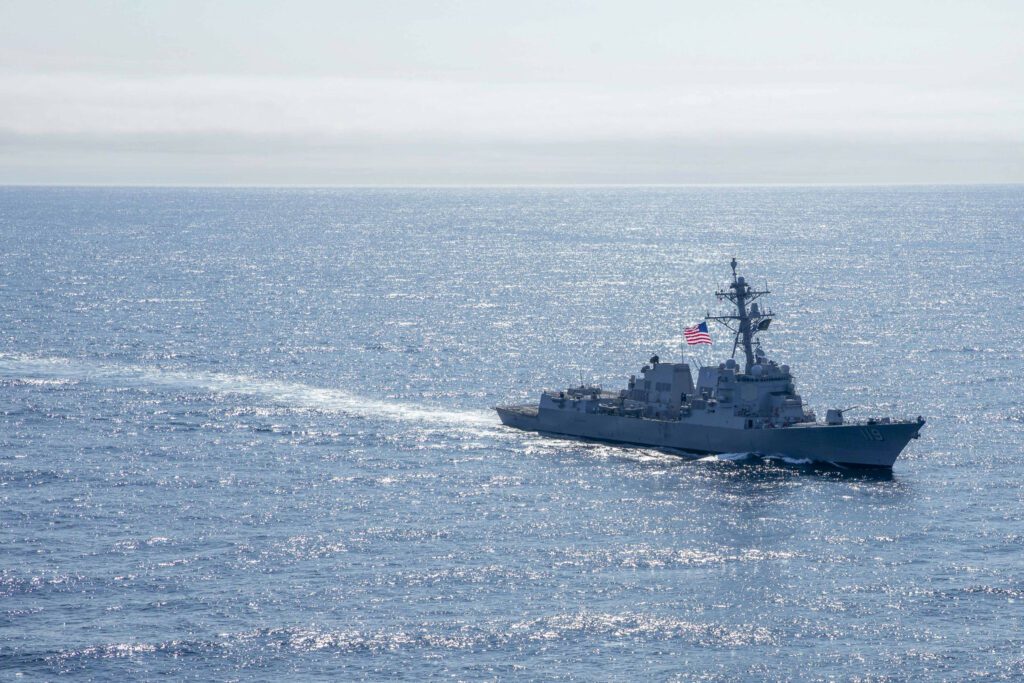Washington and its allies in North America and Europe has conducted the largest exercise in the Arctic, to strengthen partnership amid growing challenges from Russia and its quasi-ally China.
Operation Nanook 2024 concluded on Monday in northern Arctic waters. Participating units were Canada’s offshore patrol vessels HMCS Margaret Brooke and HMCS Harry DeWolf, Denmark’s patrol vessel HDMS Lauge Koch, the U.S. Coast Guard cutter USCGC Northland, and the U.S. Navy destroyer USS Delbert D. Black, the U.S. Second Fleet said in a statement on Tuesday.
These vessels conducted maritime interception operations, gunnery exercises, search and rescue simulations, and fleet maneuver drills near Nuuk, the capital city of Greenland. The island is the Danish autonomous territory in North America, which lies between the Arctic and Atlantic oceans.
U.S. Navy destroyer USS Delbert D. Black participates in a photo exercise in northern Arctic waters during Operation Nanook on August 18.
U.S. Navy destroyer USS Delbert D. Black participates in a photo exercise in northern Arctic waters during Operation Nanook on August 18.
Mass Communication Specialist 3rd Class Rylin Paul/U.S. Navy
Russia and China have expanded their Arctic cooperation, causing great concerns in other states within the region. Moscow has been upgrading military capabilities while Beijing is seeking to get involved in regional governance—even though its territory is 900 miles away from the Arctic Circle.
The Pentagon revealed an updated Arctic strategy last month, which called for increased military presence, intelligence capabilities, and cooperation with Washington’s allies. The document also listed climate change as a challenge as a thawing region made access easier for multiple actors.
The Canada-led exercise, which the U.S. Second Fleet described as “the largest of its kind in the Arctic,” focused on the ability of multinational forces to operate effectively in the challenging northern environment and further strengthen the partnership between Washington and Ottawa.
U.S. Coast Guard cutter USCGC Northland transits Godthab’s Fjord in Greenland during Operation Nanook on August 21.
U.S. Coast Guard cutter USCGC Northland transits Godthab’s Fjord in Greenland during Operation Nanook on August 21.
Mass Communication Specialist 3rd Class Rylin Paul/U.S. Navy
This exercise showed the strength of U.S.-Canada collaboration and their shared commitment to maintaining stability in the strategic Arctic waters, said U.S. Navy Vice Admiral Doug Perry, the Second Fleet’s commander. The Arctic drills had “reinforced the collective deterrence capability.”
Operation Nanook is designed to exercise the defense of Canada and to secure its northern regions. “State and commercial actors from around the world are becoming more interested in the long-term benefits of operating in the Arctic as the region becomes more accessible,” according to Ottawa.
Besides Operation Nanook, U.S. special operations forces have recently completed the first phase of exercise Operation Polar Dagger, taking place in the Arctic, the Bering Sea, and Alaska.
Last week HNoMS Otto Sverdrup completed an important patrol in Svalbard. Patrolling in these strategically important areas helps protect Norway’s interests and monitor activities in the region. pic.twitter.com/0S3y5nWRKn
— Norwegian Armed Forces | Forsvaret (@Forsvaret_no) August 26, 2024
Norway, a NATO member in the Arctic region, also announced on Monday that frigate HNoMS Otto Sverdrup completed an important patrol around the Svalbard archipelago in the Arctic Ocean last week. The islands are situated midway between Norway’s northern coast and the North Pole.
“Patrolling in these strategically important areas helps protect Norway’s interests and monitor activities in the region,” the Norwegian Armed Forces said in a post on X (formerly Twitter). The 5,290-ton warship is armed with air defense and anti-ship missiles, torpedoes, and a naval gun.
Oslo released its Arctic policy in 2021, which said “the Arctic will continue to be Norway’s most important area of strategic responsibility.” It accused Moscow of having expanded Russian infrastructure in the Arctic and has developed new military capabilities that strengthened its response capacity.
Meanwhile, Norway supported cooperation with China, a non-Arctic state, based on respect for international law and within the framework of existing cooperation structures. The document said China played a part in solving problems related to climate and environmental issues in the Arctic.
Source link : http://www.bing.com/news/apiclick.aspx?ref=FexRss&aid=&tid=66cf1cfb0d1d4319a581be82eec7e8a3&url=https%3A%2F%2Fwww.newsweek.com%2Fus-news-allies-nato-patrol-arctic-amid-growing-challenge-russia-china-1945262&c=17746107764824507765&mkt=en-us
Author :
Publish date : 2024-08-28 01:37:00
Copyright for syndicated content belongs to the linked Source.
